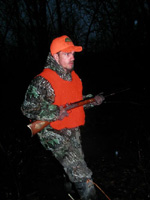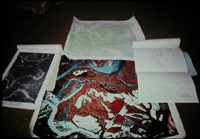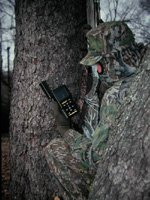
|
Features
|
|
|
|
Books
|
|
|
|
Fun & Games
|
|
|
|
Contact Us
|
|
|
John's Journal... Entry 113, Day 3
LOST IN DEER COUNTRY
How To Find Your Way Out Of The Woods?
 EDITOR'S
NOTE: Probably every outdoorsman who has spent hours hunting in unfamiliar
places has at some time in his life been lost in the woods. To enable
you to navigate more effectively and safely through deer country and to
get into these remote locations where big bucks stay, the Night Hawk internet
team interviewed some of the nation's leading woods navigators and survivalists.
EDITOR'S
NOTE: Probably every outdoorsman who has spent hours hunting in unfamiliar
places has at some time in his life been lost in the woods. To enable
you to navigate more effectively and safely through deer country and to
get into these remote locations where big bucks stay, the Night Hawk internet
team interviewed some of the nation's leading woods navigators and survivalists.
John Street, president of Woods Walker, Inc., is a nationally known survival
expert whose company made the original space blanket. Patrick McHugh is
the general manager of Outdoor Safety Products Division of MPI Outdoor
Safety. A woodsman and outdoor safety expert, McHugh and his company have
designed products not only to prevent you from getting lost, but also
to aid you in the event that you do become lost. Al Kavalauskas is a veteran
woodsman, an expert navigator and a well-known outdoorsman. Bill Wildprett
is division manager of the Silva Company, which also makes and sells compasses
worldwide.
 Even
if you have a map and a compass with you, if you don't know where you
are or how you've entered the woods, you'll have a difficult time finding
your way out of the woods -- unless you can locate a landmark on your
map, go to that landmark and then begin to figure your way out of the
woods. "Without a map and compass, one of the best ways to get out
of deer country is to follow some type of drainage like a creek, a stream,
or a river until it intersects a road or a path," Kavalauskas mentions.
Even
if you have a map and a compass with you, if you don't know where you
are or how you've entered the woods, you'll have a difficult time finding
your way out of the woods -- unless you can locate a landmark on your
map, go to that landmark and then begin to figure your way out of the
woods. "Without a map and compass, one of the best ways to get out
of deer country is to follow some type of drainage like a creek, a stream,
or a river until it intersects a road or a path," Kavalauskas mentions.
 Street
advises that a hunter only has to make one of two decisions if he is going
to get out of deer country once he accepts the fact he is lost. "If
you have a compass, you can choose any direction and try to walk a straight
line that hopefully will take you to an area you are familiar with or
to some type of access road, fire lane, or path," Street says. "If
you don't have a compass, you have to prepare to make yourself as visible
as you can. Then you will be found soon. Smoke is one of the most visible
signals a hunter can utilize to let searchers know where he is located.
There are basically two types of smoke: white smoke and dark smoke. If
you are lost in snow country, use dark smoke. If you are lost in heavily
timbered country with no snow, light smoke is a better choice. The wood
you choose to build your fire determines the kind of smoke you will produce.
Wood and plants with plenty of water in them and green leaves generally
produce white smoke. To have dark smoke, burn wood with more resign in
it, such as pine. Go to an open area, build a huge fire, and concentrate
as much smoke as you can in that region."
Street
advises that a hunter only has to make one of two decisions if he is going
to get out of deer country once he accepts the fact he is lost. "If
you have a compass, you can choose any direction and try to walk a straight
line that hopefully will take you to an area you are familiar with or
to some type of access road, fire lane, or path," Street says. "If
you don't have a compass, you have to prepare to make yourself as visible
as you can. Then you will be found soon. Smoke is one of the most visible
signals a hunter can utilize to let searchers know where he is located.
There are basically two types of smoke: white smoke and dark smoke. If
you are lost in snow country, use dark smoke. If you are lost in heavily
timbered country with no snow, light smoke is a better choice. The wood
you choose to build your fire determines the kind of smoke you will produce.
Wood and plants with plenty of water in them and green leaves generally
produce white smoke. To have dark smoke, burn wood with more resign in
it, such as pine. Go to an open area, build a huge fire, and concentrate
as much smoke as you can in that region."
TOMORROW: EQUIPMENT FOR WHEN YOU BECOME LOST
Check back each day this week for more about Lost In Deer Country...
Day 1 - Pre-Trip Planning
Day 2 - What To Do If You Become Lost
Day 3 - How To Find Your Way Out Of The Woods?
Day 4 - Equipment For When You Become Lost
Day 5 - Important Survival Information